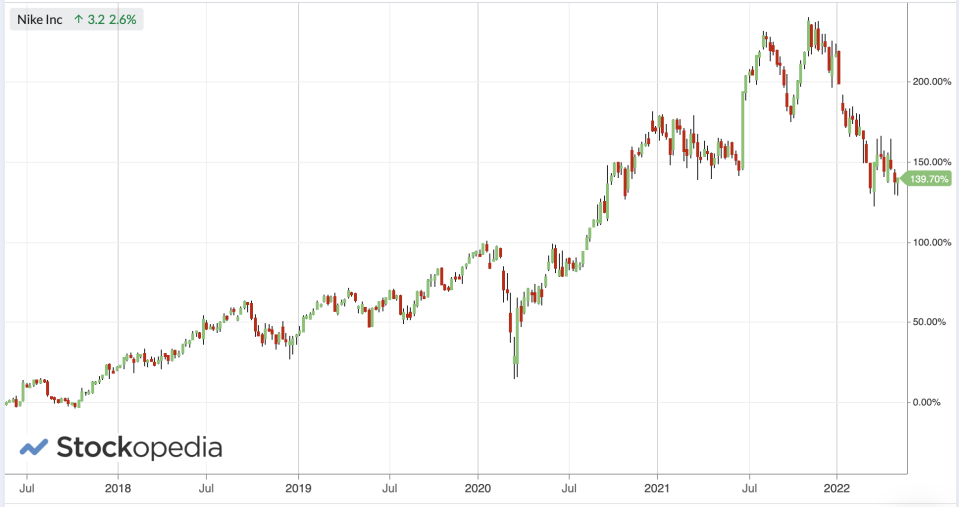Does Nike Inc have the quality traits to resist economic pressures?
Companies with the financial firepower to resist economic turmoil are always high on investor shopping lists. Finding these stocks isn’t easy, but one with a particularly impressive track record is Nike Inc (NYQ:NKE).
Over the past five years, the company’s shares have delivered a gain of 29.1% relative to the market. Sectoral trends have undoubtedly played a part in that, but Nike’s strengths have been crucial too.
But with markets facing a host of economic uncertainties and macro pressures, the question now is whether Nike can still offer the kind of resilience that investors are looking for.

GET MORE DATA-DRIVEN INSIGHTS INTO NYQ:NKE »
Why the top investors target quality
Elite money managers often point to company quality as a defining factor in long-term investing success. Terry Smith, the highly respected founder of Fundsmith, has said that all the clues to a good business can be found in its numbers. He cemented his formidable reputation on the basis of buying good companies, not overpaying for them and then doing nothing.
But for regular investors, what does that strategy really involve?
The answer is that quality can show up in all sorts of ways in different companies. Helpfully, there are some universal signs to look for. Truly resilient firms often have defensible competitive advantages in their markets. That means they can generate consistently high levels of profitability - no matter what the economy throws at them.
Well-defended profitability not only gives them a financial safety net, but also the flexibility to allocate capital effectively. That means deploying time, money, ideas and people to best effect. If they do it well, you’ll see it in the accounts.
In Nike's case, a huge transformation has been underway in recent years. It has been laser focused on increasing its direct-to-consumer business. That's literally meant severing relationships with many of its old distribution partners, like sports stores. In their place, Nike has built a new 'digital' culture, focusing on the relationship with its customers and dramatically increasing the desirability of its products.
In terms of numbers, the clues can typically be found in profitability measures like operating margins and return on capital employed. When these stretch into double-digits over several years, it can be a pointer to a strong, profitable business.
But of course, premium profitability can attract premium valuations, so it’s worth considering valuation and future growth too. A simple rule of thumb here is the price to earnings growth ratio (PEG). This is a guide to whether the valuation is reasonable versus the rate of earnings growth. A PEG of 2 is generally considered expensive, so screening for anything less will restrict the results to more reasonable valuations.
Here are those rules:
Positive 5yr relative price strength (ie. it has performed better than the market)
5yr average operating margin of more than 10%
5yr average return on capital employed (ROCE) of more than 15%
5yr average return on equity of more than 15%
Rolling PEG ratio of less than 2
Finding quality in the numbers
With a five-year average operating margin of 12.2%, Nike is clearly doing something right. Solid operating margins are a pointer to firms with products that customers can’t get enough of - and are unlikely to look elsewhere for. This kind of pricing power contributes to the fact that the company’s earnings per share have been growing at a compound rate of 11.5% over the past five years.
In its most recent earnings report in March, the company reported that Q3 revenues were up 5% on the same period last year to $10.9 billion. Of that, Nike Direct sales were $4.6 billion, which was up 15%.
With a long-term average ROCE of 24.7%, it’s also clear that Nike has been doing a good job of allocating capital and reinvesting to support further growth in its profitability. This shows up in a five-year average Return on Equity of 39.5%. Return on Equity is a measure of how efficiently a company uses shareholders’ equity to generate profits. Companies with consistently high ROEs tend to exhibit the high-quality, competitive business traits that deliver resilient profitability.
With a PEG of 1.51, Nike falls within the range of shares that aren’t obviously excessively valued - at least when you look at how the share price compares with current earnings growth.
After a solid relative performance over five years, the company’s share price is currently trading -26.9% on a six-month basis. Sector rotations and wider market trends are affecting entire industries in different ways - and it’s not clear how that will play out in the months to come.
Hunting for strong businesses
Overall, Nike has some impressive longer-term quality traits that suggest the business is well placed to weather turmoil and continue growing. As Terry Smith insists, when it comes to finding fundamentally good companies, it's worth asking yourself:
How has the business achieved being good - and is it sustainable?
How does it compete - and it is doing it effectively?
Does it show the signs of a business that can allocate capital well?
Companies that score well against this kind of checklist can be well-placed to see their profitability benefit from the compounding effects of competitive strength. And just like Terry Smith, once you’d found one, it can be worth sitting on your hands and holding for the long term. And in the case of Nike, of course, his Fundsmith fund does indeed own it.
What does this mean for potential investors?
Finding good quality stocks with the potential to compound your returns over time is a strategy used by some of the world's most successful investors. To find out more, you can explore the company's StockReport here.

 Yahoo Finance
Yahoo Finance 